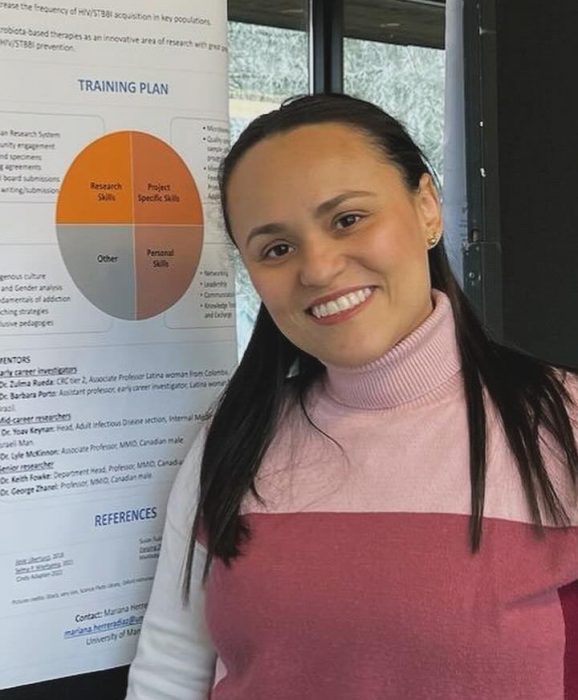
Miriam Gonzalez from the College of Nursing received funding for research into health service accessibility for families raising a child with a neurodevelopmental disability.
Rady researchers receive early career transition awards
Two Rady Faculty of Health Sciences early career researchers have recently been announced as recipients of awards from the Canadian Institutes of Health Research.
Established in 2022, the Research Excellence, Diversity, and Independence (REDI) Early Career Transition Award is available to post-doctoral researchers, clinicians and research associates from specific underrepresented groups to help them launch their research faculty careers in Canada.
The award has two phases across a maximum of six years to support the transition of its winners to independent research careers. The first phase covers three years with mentored career development and the second phase supports up to three years in their positions as principal investigators.

Mariana Herrera Diaz
Mariana Herrera Diaz, a postdoctoral fellow at the Max Rady College of Medicine, received $270,000 for the first phase of her research into the impact of drug use on the microbiome and sexually transmitted and blood-borne infections (STBBI).
Herrera Diaz is originally from Colombia and moved to Winnipeg in 2021 with a PhD in epidemiology to work with Dr. Zulma Rueda, associate professor of medical microbiology and infectious diseases.
She said the effects of drug use on microbiomes, the microbes that live in our bodies, have been under-researched. She aims to identify whether drug use is associated with changes in bacteria that live in the genitals, the risk of STBBI and the HIV treatment outcomes in those living with HIV.
“The first phase is to understand how methamphetamine use affects the microbiome and the risk of STBBI acquisition. I’ll be looking at two populations – people who live with HIV and people that attend shelters in Winnipeg,” Herrera Diaz said.
“In the second phase, I want to expand the understanding of how different drugs in different geographic regions affect the respiratory, gut and genital microbiomes.”

Miriam Gonzalez
Miriam Gonzalez, a lead research associate at the College of Nursing, received $270,000 for the first phase of her research into health service accessibility for underserved families raising a child with a neurodevelopmental disability (NDD).
She said racialized or disadvantaged families who are raising a child with NDD have greater difficulty accessing services and are underrepresented in health research.
“We need to generate the interest to help these families,” she said. “Understanding caregivers’ experiences is critical for promoting accessible and inclusive service access, as well as parental wellbeing.”
The first phase of the project aims to understand the perspectives of racialized caregivers and their experiences of accessing services for their child. The second phase will focus on the barriers and facilitators the parents may face to accessing mental health services, for their child or themselves as they deal with anxiety, depression and stress.
“What is unique is that we are using a multi-method approach, including arts-based methods, which is ideal for working with underserved populations. We are also using a patient-oriented research approach – collaborating with parents with lived experience and community organizations serving these families. This ensures the research is relevant to these families and will facilitate knowledge uptake.”
Gonzalez is a UM alumna with a master’s degree in community health science and a PhD in applied health sciences. She returned to the university last November after doing a postdoctorate at McGill University, and works alongside her primary mentor, Dr. Roberta Woodgate, distinguished professor of nursing and Canada Research Chair in child and family engagement in health research and health care.
“I’ve always been interested in underserved populations,” Gonzalez said. “My parents immigrated from Nicaragua 44 years ago, so growing up I was able to see the challenges and issues of ethnic minority caregivers.”






